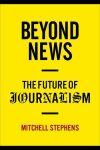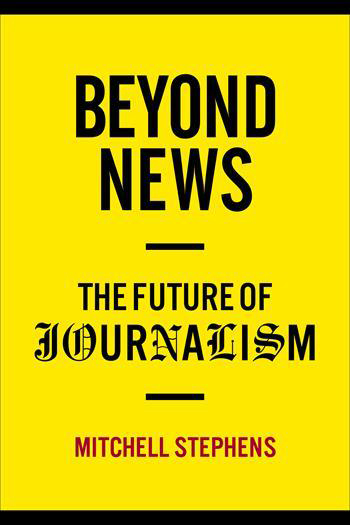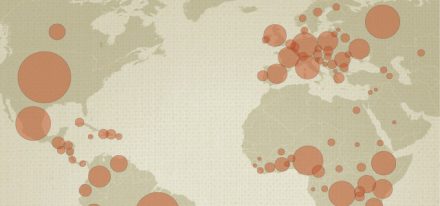 Author: Mitchell Stephens
Author: Mitchell Stephens
Publisher: Columbia University Press – 232 pages
Book Review by: Kumar Balani
The nature of journalism, like all fields of work, has evolved over the years, and will continue to do so, now and in the far future. We have heard it said many times: “the only thing permanent is change.” We all know from experience and observation that change is constant and change does not and cannot stand still.
Change in some fields is at times rapid, and at other times, very slow and sometimes almost imperceptible. In the case of journalism, it has changed so dramatically since the advent of the Internet, that its economic impact on owners of, and employees in media businesses, has been simply devastating.
Hundreds of newspapers all over in the United States folded and tens of thousands of their employees were laid off following the years when distribution of news and advertising did not require paper, printing or even people. All that was needed was the World Wide Web.
I say this from personal experience as a media business owner and observer of well-established newspapers and magazines that were forced to close because they did not change their business model rapidly enough, including some friends who owned such entities.
In this highly insightful book, journalist and journalism professor Mitchell Stephens points out that “news” (as understood by the public, including perhaps the vast numbers of people who are unable to distinguish fact from opinion) has become very commonplace and has practically lost its monetary value because it can be so freely and widely disseminated. The two main ‘victims’ of such free news dissemination have been newspaper sales/subscription dollars, and paid advertising revenues.
Owners of newspapers, magazines, and other print media who quickly built an adequate online presence were able to recoup their loss of print revenue, and many are now thriving because of the added benefit of lower operating expenses, including no paper, printing, postage or trucking costs, and in some cases, very little to no cost of content, except the cost of time in sourcing it.
Today, for an online-based media business to be successful, a growing audience is essential: people that will read content and ads. The essential requisite for a growing audience (the basis of ad revenue) is attractive or almost compelling, content. And in order to provide such content, it has to be different from what is commonly available on the Internet.
Some print-online (or online-only) media businesses have become successful as news and information integrators, providing content tailored to the different characteristics of their audience. For example, NJ Biz provides business news and features that interest business owners and executives doing business and/or residing in New Jersey
Mitchell suggests a new type of journalism which he calls ‘wisdom journalism’ that has any one or a combination of these elements: enterprising, exclusive, explanatory, informed, insightful, interpretive, investigative, and even opinionated forms of reporting.
To the above, I would add these characteristics: analytical, historical, and perspective. One type of these is a ‘news analysis.’ While all these added-value kinds of reporting are needed (to be distinct from the many sources of information on the Internet) in order to succeed in journalism today, I believe it is critical to present them to readers in sections of their print or online newspaper clearly marked as ‘news’ or ‘editorial’ or ‘opinion’ or ‘Op-Ed’.
I distinctly remember a crucial lesson I learned on the importance of separating fact from opinion to gain credibility and build a good reputation in journalism. On the first day in a class on news reporting (when I was pursuing a Bachelor of Arts in Journalism degree at the University of the Philippines) the professor filled the entire long blackboard with just five large letters: FACTS. He was just silent for a while. Then, an hour and a half was spent discussing 20 statements on a sheet of paper on whether each one was a ‘fact’ or an ‘opinion’.
In the news-writing tests we took during this course, we progressively improved our scores from an unbelievably low average 25 percent during the first test to an average 95 percent in the last.
It’s unfortunate that reporters at many news media in the U.S. today – online, print, radio, and television – don’t realize the harm they’re inflicting upon their audiences by passing on their own biased views as facts. It isn’t surprising that they’re categorized by their readers, listeners and viewers as ‘liberal’ or ‘conservative.’ The desired labels are ‘balanced’ and ‘objective’ that can win them respect from larger audiences and more revenues for their employers from growing numbers of advertisers.
Mitchell begins by tracing the history of the nature and purpose of journalism from its earliest years in the United States – during the struggle for independence from Britain – until 2014, when this book was published.
He first underscores the primacy of the freedom of information in a society, in his initial chapter by quoting Thomas Jefferson’s famous words in his 1787 letter: “Were it left for me to decide whether we should have a government without newspapers or newspapers without a government, I should not hesitate a moment to prefer the latter”
He continues presenting the evolution of journalism in the U.S. through different chapters that highlight the prevailing trends in different periods of history. We present an overview of what you will find in this book.
Introduction
- “Principles, Opinions, Sentiments, and Affections” : The Journalism Out of Which the United States Was Born
- “Yesterday’s Doings in All Continents” : The Business of Selling News
- “Circulators of Intelligence Merely”: The Devaluation of News
- “Bye-Bye to the Old Who-What-When-Where” – The Return of Interpretation
- “Much As One May Try to Disappear from the Work” : The Argument Against Objectivity
- “The World’s Immeasurable Babblement” : What Does and What Does Not Make Journalism
- “Shimmering Intellectual Scoops” : The Wisdom Journalism, the Journalism Organization, Their Audiences, and Our Politics
This is a book I recommend as an essential read for journalists and media owners, as well as for anyone who values the importance of news and unbiased perspective in a successful democratic society.
Author:
Mitchell Stephens is a professor of journalism at New York University’s Arthur L. Carter Institute. His books include A History of News, named a New York Times “Notable Book of the Year”; The Rise of the Image, the Fall of the Word; Broadcast News; and Writing and Reporting the News.
He has written for The New York Times, the Washington Post, and the Los Angeles Times. Much of the research for this work was completed while Stephens was a fellow at the Shorenstein Center at Harvard’s Kennedy School.







